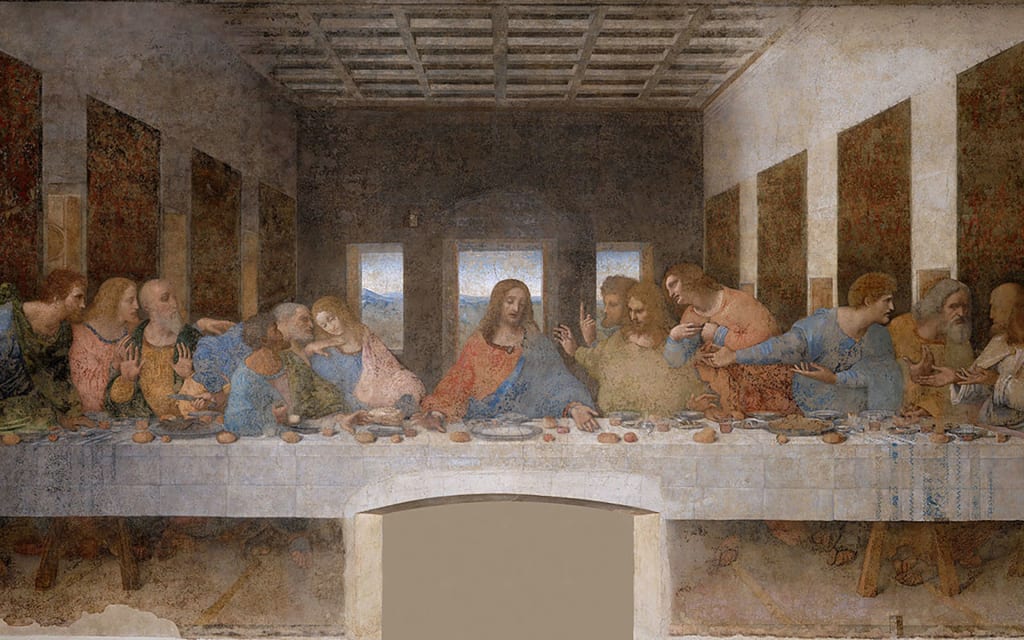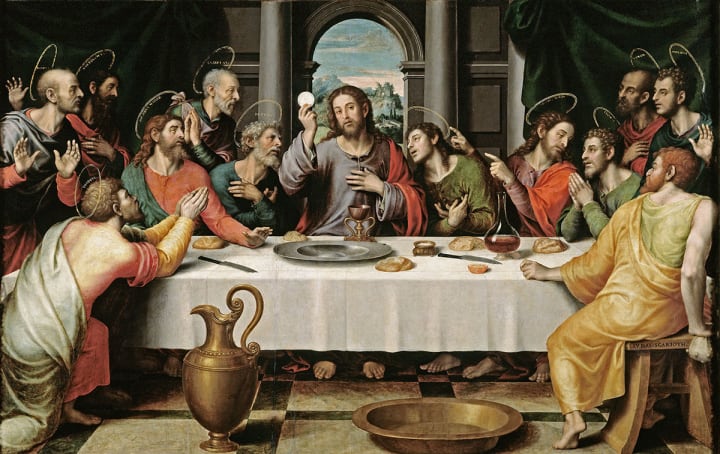Health in the Bible
Religion often acts as a positive force in peoples' lives, but there are some controversial representations of health in the Bible.

While most religious people are drawn to their religion for spiritual reasons, studies have shown that adamantly following a religion can impact your lifestyle and your health. Religion can have an impact on a person's weight, overall happiness, anxiety, and blood pressure. In many cases, people seek out religion in times of severe stress. The community and faith provided by religious organizations has been shown to help people through hardship, and many choose to continue their dedication to religion because of the help they were given. In this way, religion helps many people walk away from harmful circumstances in their lives such as drug use, alcoholism, or dangerous professions.
Religion is not always the best thing for your weight. A 2011 study presented to the American Heart Association showed that young adults who frequently attend religious activities are 50 percent more likely to be obese by the time they are middle-aged than those who are not involved with the church. Researchers suspect that this is due to the comfort food events, such as potlucks, that are associated with worship. Despite higher weights, religious people tend to live longer than non-religious people. Researchers believe this is due at least in part to the fact that religious people are less likely to smoke.
Religious people tend to be healthier emotionally than non-religious people. A study published in American Sociological Review states that the social happiness of participating in regular services, regardless of denomination or belief system, contributes to an increased happiness overall. Religion gives people a way to build social networks and closer ties, which leaves them more satisfied with life. Likewise, religious people tend to be less anxious when they make mistakes. They are able to fall back on their faith during setbacks, leaving them less agitated when things go wrong. Studies have also shown that religion improves responses to psychiatric treatment in depressed patients. Specifically, the belief that a supreme being cares for people made them more receptive to depression treatments.
Studies suggest that being part of a larger community encourages religious people to get preventative care more often than non-religious people. A study in Health Education & Behavior found that regular churchgoers are more likely to get regular mammograms than non-churchgoers (75 percent of churchgoers kept up with mammograms, as opposed to only 60 percent of non-churchgoers). Religious people also tend to have lower blood pressure than their non-religious counterparts, possibly due to their lower levels of anxiety and more frequent doctor visits. More important than the impact of a religious community on your health are the choices that people make regarding nutrition based on their perceptions of health in the Bible.
Health Myths from the Bible

The Last Supper by Juan de Juanes
The Holy Bible is chock-full of guidance on life issues such as finances, leadership, relationships, humility, love, and nutrition. People searching for answers on diet and nutrition should be wary of some of the myths found in religious texts. The Bible has a lot to say about what we can and can’t eat. Altogether, there are 613 laws on health in the Bible in the Old Testament alone, and some are related to food. Trying to live up to these rules is impossible. Thankfully, God knew this and sent His son Jesus to die on a cross. With His resurrection we received grace, and now live in a time referred to as the “age of grace.” That is the most important message of the Bible. Although Christ is a redeeming figure in Christianity and Catholicism, people still focus on particular elements of the Bible—including myths surrounding health, nutrition, and food.
The Bible Says We Should Not Eat Meat.
Tomfoolery. God made a covenant with Noah that, “Everything that lives and moves about will be food for you.” Genesis 9:3. There are other examples, including The Parable Of The Lost Son (Luke 15:22-24) in the New Testament, when the father tells his sons to, “Bring the fattened calf and kill it. Let’s have a feast and celebrate.” Pundits point to Leviticus 7:22-25 and use these verses out of context. Meanwhile, these verses are a warning to the people not to strip away the fat of an animal for an offering. God wanted the best part, and the people were stealing that from Him.
Grains Are a Preferred Food Because Jesus Fed a Multitude Loaves of Bread.
All four books of The Gospel tell the tale of Jesus performing a miracle when He took five loaves of bread and two fish, broke the bread, and created enough food for the crowd of 5,000 men (plus women and children). A common myth is that since Jesus fed the people bread, grains are a food of choice. The reality is that the bread we eat today is very different from that of Jesus’ time. Our flour is a hybrid variety while Jesus’ was not. Further, 2,000 years ago flour was stone-ground and very course, unlike the fine powder produced today. Grains in our diet are ok, but only in moderation.
The Bible Tells Us Not to Eat Pork or Shellfish.

Image via Bible-Science Guy
This fable on health in the Bible is most compelling, as the Bible does prohibit the “children of Israel” from eating such fare in Leviticus 11:2. However, we have to understand the reason behind this passage—God wanted the people to learn to be obedient to Him. The exclusions of these passages can’t be applied universally. Pigs and shellfish were considered unclean, and they are not standard fare for Jews (i.e. the children of Israel) to this day. Remember, though—Christians believe that Jesus was the fulfillment of Old Testament prophecies and through the shedding of His blood on the cross, we now live in the age of grace. Trying to live up to the Old Testament laws is exhausting and impossible.
The Ezekiel Bread Is a Healthy Recipe in the Bible
Hmmm. God told Ezekiel to bake this bread recipe over human waste. Under Ezekiel’s protests, God eased up a bit and allowed the loaf to be cooked over a fire of cow’s dung. Nice. As we once again dive into the scriptures, we learn that this bread was only intended for Ezekiel. This defilement was symbolic in nature. The children of Israel were honoring false gods, and the Lord used the food debacle symbolically. This occurrence foreshadowed the imminent annihilation of the Israelites. Would you eat bread cooked over cow dung?
A Vegetarian Diet Is the Diet of Choice in the Bible.
The naysayers typically start this conversation with Adam. The only dietary stipulation to Adam was not to eat from the tree of good and evil. In 1 Timothy 4, the Bible describes people who declare we must not eat meat as evil. God promises a feast including the best of meats in Isaiah 25:6: “On this mountain the Lord Almighty will prepare a feast of rich food for all peoples, a banquet of aged wine—the best of meats and the finest of wines.” Are we led to believe that Jesus poisoned the people when He fed them 5,000 fish?
God Made Wheat and, Therefore, It Is Healthy.

Image via Christianity Malaysia
This is a fallacy that is a weakness of the flesh. Wheat is a carbohydrate. We crave carbs because they produce blood sugar surges. The discussion of unleavened bread in the Bible is in Exodus 13:6. Again, this is more a command from the Lord as an act of obedience than for one of nutritional value. The only difference between unleavened bread and leavened bread is the yeast. Whole wheat bread and other grains are a part of a healthy diet when consumed in moderate amounts. Yes, God made wheat. However, bear in mind that God also made lead and cyanide.
The Bible Promotes Milk and Honey as Healthy Foods.
This illusion is extrapolated from Exodus 13:5, where the land of present day Israel is said to be flowing with milk and honey. We accept this metaphorically to mean the land is rich and fertile. However, milk and honey are not superfoods. How healthy is honey? Debatable. It does have some healthy attributes, however, it is high in fructose. And milk? The consensus is about the same. Some good, some bad. Again, the biblical reference promoting milk and honey was merely illustrative.
People in the Bible Consumed Olive and Flax Seed Oils. Therefore, They Are Good for You.
The olive tree is one of the most prevalent in the Middle East. There are over 150 references to olive oil in the Bible. However, there are none that directly reference its consumption as food. Its primary uses were for illumination, as an ointment, and in the manufacturing of soap. We know that it was also used for anointing, or smearing a dabble on someone’s forehead for healing. That is the closest it came to the mouth. In the same regard, flax seed was the most important plant fiber in the Bible because it was used to make linen. There is no mention of the consumption of flax seed oil in the Bible.
The Bible Tells Us Alcohol Is Forbidden.

Image via LDS
Nothing could be further from the truth. In fact, Jesus turned water into wine in John chapter 2. Excessive drinking and drunkenness are frowned upon, but there are many verses confirming that drinking wine is acceptable—and even good for you. “No longer drink only water, but use a little wine for your stomach’s sake and your frequent infirmities” 1 Timothy 5:23. Even Jesus, who lived a sinless life, drank wine on occasion. Ecclesiastes 9:7 states, “Go, eat your bread with joy, and drink your wine with a merry heart, for God has already approved what you do.”
The Vegetarian Diet Gave Daniel Extraordinary Health.
Daniel abstained from eating the good food and wine of the king’s table as a form of fasting during his first fast. He consumed only vegetables and water. He fasted a second time, eliminating all meat, wine, and other rich foods. The popular reference is to Daniel’s first fast. However, the diet considered a “Daniel fast” is entirely different, allowing fruits, grains, nuts and seeds, legumes, and oils. During Daniel’s first fast, God worked a miracle by actually improving Daniel’s health over a ten day fast. Eating vegetables alone is not a healthy diet.
About the Creator
David McCleary
Holistic health practitioner. Believes in using natural remedies over traditional medications whenever possible. Volunteers at a recycling plant.






Comments
There are no comments for this story
Be the first to respond and start the conversation.